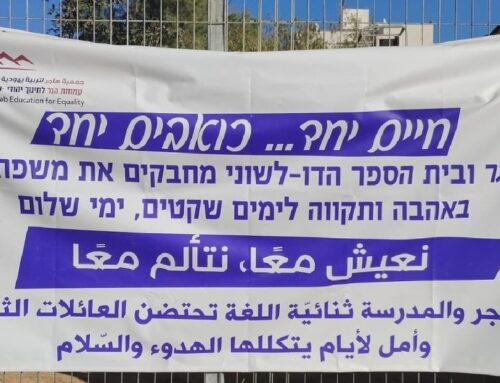 It’s become fashionable in the last few years for Israeli politicians and activists to drum up interest for their campaigns in more accessible locations to the general public. These types of meetings, given the overall informality of Israeli society, allow for an up-close-and-personal experience with speakers, unlikely available anywhere else in the Western world.
It’s become fashionable in the last few years for Israeli politicians and activists to drum up interest for their campaigns in more accessible locations to the general public. These types of meetings, given the overall informality of Israeli society, allow for an up-close-and-personal experience with speakers, unlikely available anywhere else in the Western world.Tuesday night I attended an event co-hosted by One Voice, and a new political movement called V15 (for more info about the latter, click here for a recently published article in Haaretz). While V15 does not endorse any one party or politician, its overall thrust is towards the replacement of the current government with one that is more amendable to a peace deal with the Palestinian Authority.
The speaker, former Labor MK Daniel Ben-Simon, can currently be seen on Channel 2 in Israel, and was a former journalist for Ha’aretz. Although he only served for one term, he is notable for being against the entry of Labor into the government in 2009, eventually leaving after only two years to start his own party, which ultimately never came to fruition. As the event was geared towards new English-speaking olim, Ben-Simon spent part of his talk giving a general overview of the current political climate, emphasizing the dilemma centering around possession of the West Bank. He was adamant about the fact that this election could be “history making”, a description that many of us on the left have used euphemistically to indicate our discomfort with Israel’s political shift ever further to the right. While most Israelis have tried (often in vain) to ignore the diplomatic situation, preferring to vote on economic issues– on which Bibi find himself at a disadvantage– the status quo could not be continued to be ignored.
With the exception of the Arab parties and Meretz, however, politicians have been trying to steer clear of discussing the issue. Denial notwithstanding, the elections were absolutely connected to this particular issue, even if Bibi’s loss comes about due to concerns about the standard of living.
Bibi, he said, had not made any progress over the last 6 years in office, a situation likely to end to a dramatic change of the status quo, and one likely for the worse. Israelis do not live in a ghetto and cannot continue acting as though they exist in isolation; Ben-Simon was quick to point out the similarities between Israel and her Arab neighbors, many of whom speak Hebrew, use Israeli currency and are part of its cultural milieu.
Without giving away his predictions about the final results of the election, Ben-Simon claimed that a Bibi downfall could “change the face of Israel”. A Herzog-led government, he said, would immediately launch a diplomatic initiative, going directly to Ramallah to address the parliament, and reaching out to other moderate forces in the Arab world. He also, amusingly, took an incredibly dim view of the wave of celebrity-recruitment occurring at the moment in the Knesset. Commenting on the recent edition of former Beitar player Eli Ohana to Bennett’s party he quipped: “It’s a bit of a joke having to interview some of these people…you can’t just play games with this stuff.” Ohana has since backed away from the offer after an uproar amongst Habayit Hayehudi’s party members.
Although adamant about the necessity to withdraw from the West Bank, he predicted that, given the sensitivities surrounding the issue, civil war could erupt. It is here that I have to part ways with Ben-Simon; the issue of settlements and the public’s devotion to them is often overstated. By overstated, what I mean is that a large majority of the Israeli public, including the right, would easily give them up if it directly infringed on their day-to-day well-being. However one chooses to interpret “well-being” is up for debate, but I simply find it unlikely that most Israelis, with the exception of the far-right would lift a finger to prevent a withdrawal from being carried out. One need look no further than a new poll released by the Israel Democracy Institute, stating that a whopping 62% of religious Zionists believe that maintaining a Jewish majority was more important than maintaining the entirety of the Land of Israel. I still believe, despite all the naysayers, that when push comes to shove, Israeli society will opt out of its own destruction.






Leave A Comment